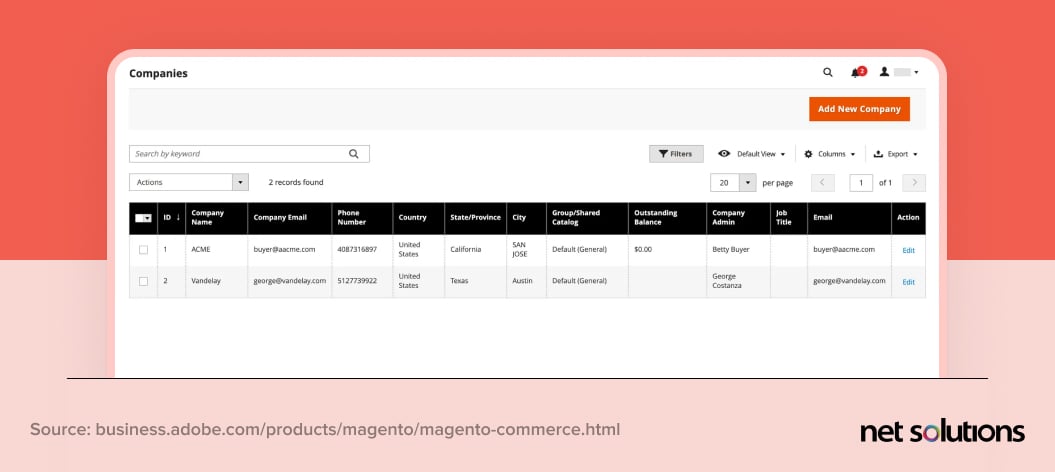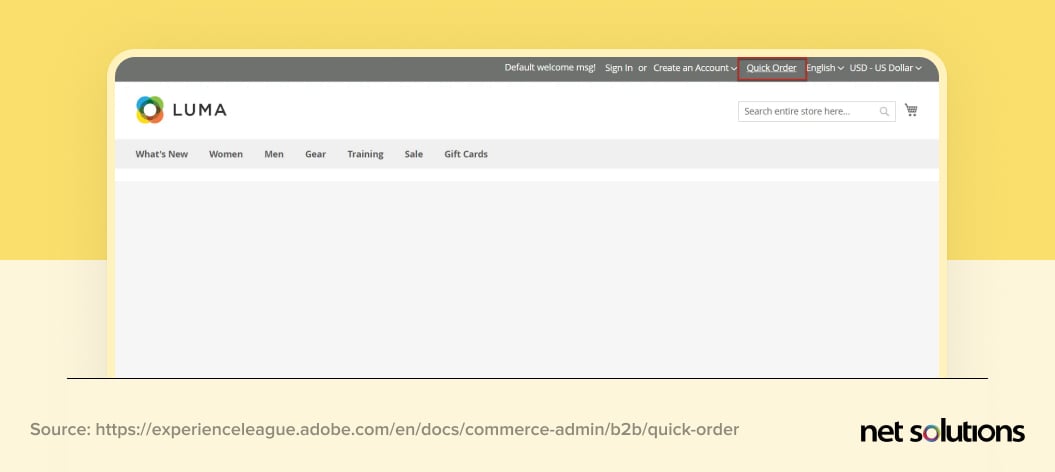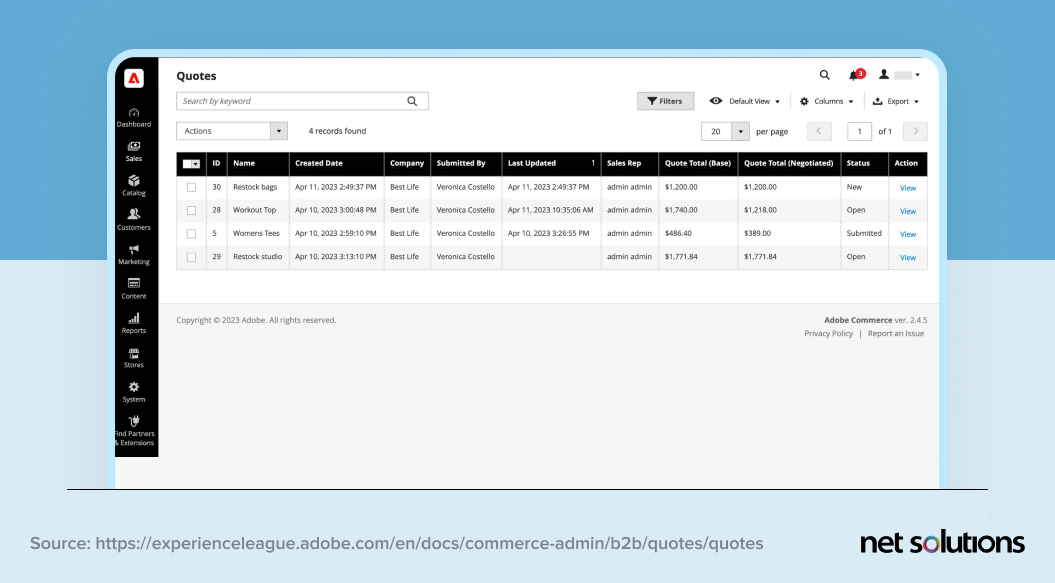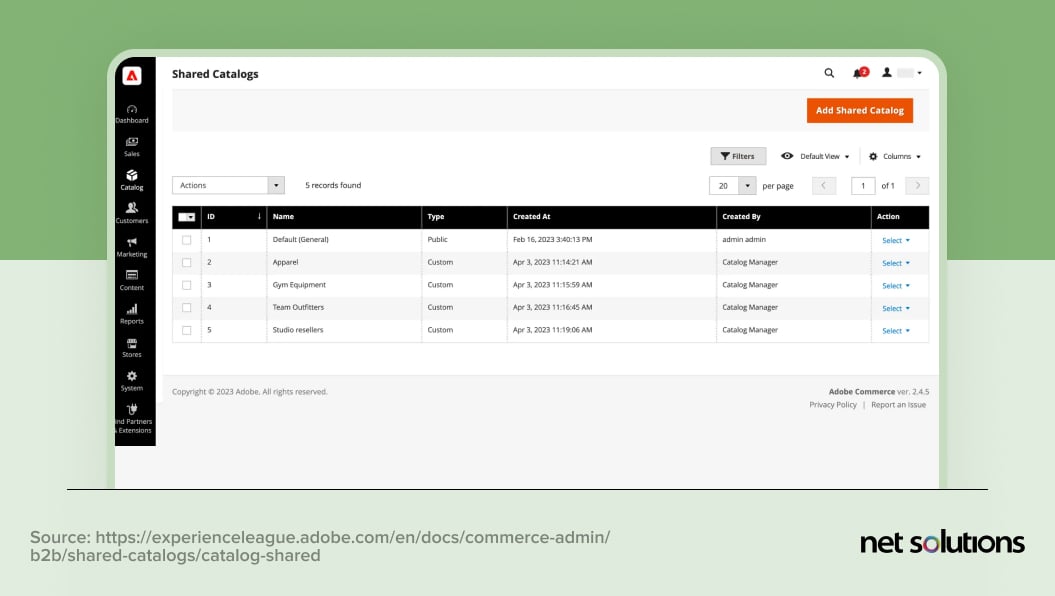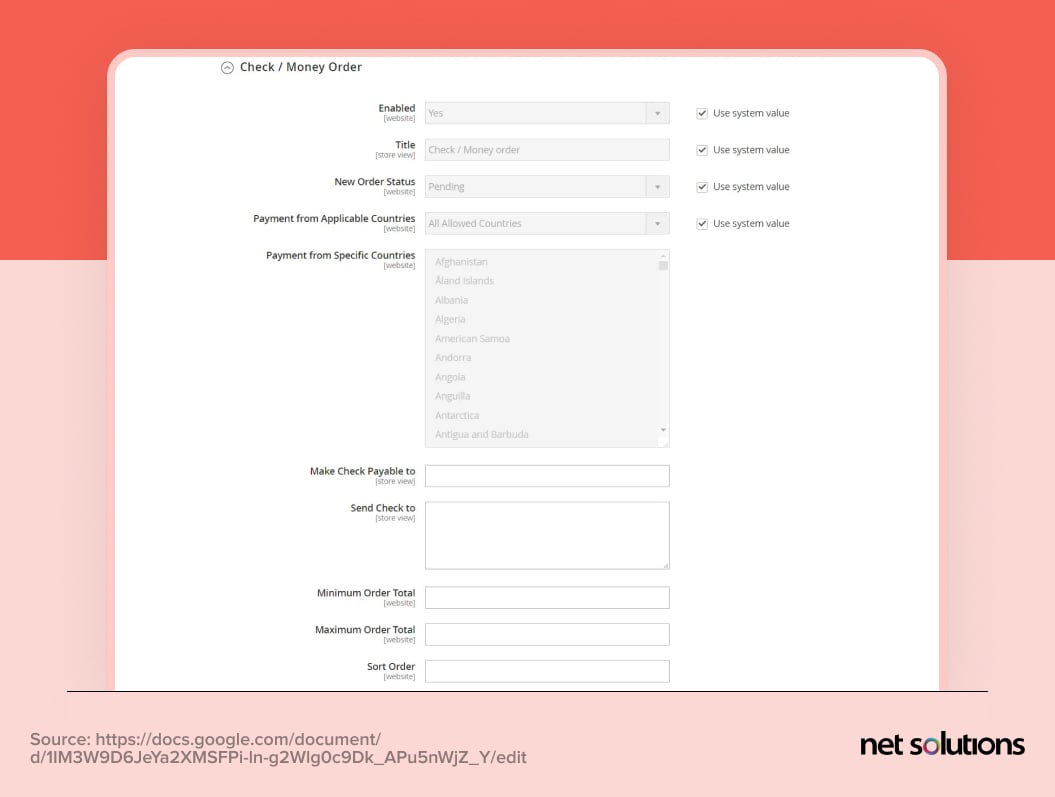In this article, we’ll discuss the key B2B features of Adobe Commerce (Magento) that make it truly stand out among other offerings.
Adobe Commerce (previously Magento) is a comprehensive, secure and flexible enterprise eCommerce platform designed to help create world-class B2C and B2B experiences, all from a single platform. For its extensive B2B (business-to-business) features and a history of continued innovation in B2B capabilities, we consider Adobe Commerce one of the top B2B eCommerce platforms.
Adobe Commerce B2B extension is available for Adobe Commerce on cloud infrastructure (Adobe Commerce Pro and Adobe Commerce Managed Services) as well as Adobe Commerce on-premises.
In this guide, we will detail:
- Why Adobe Commerce helps drive B2B eCommerce growth
- The key B2B capabilities of Adobe Commerce
- How the core capabilities of Adobe Commerce benefit B2B business
- How to get started with Adobe Commerce
Is Adobe Commerce (Magento) Good for B2B?
Adobe Commerce supports integrated B2B functionality, allowing companies to support B2C and B2B stores and marketplaces all from a single interface, with the opportunity to scale up to an unlimited number of storefronts across brands, catalogs, countries or currencies.
Adobe Commerce is a highly competitive B2B platform, whether used solely for B2B or in combination with other business models and brands. Whether you’re a wholesaler, manufacturer or distributor, Adobe’s intelligent B2B solution helps you manage multiple tiers of buyers, track quotes and orders, manage inventory, and leverage the latest in AI-powered personalization.
The B2B extension is available for all supported versions of Adobe Commerce (on cloud or on-premises), but not for Magento Open Source. The B2B extension is installed after the Adobe Commerce infrastructure is installed, following the instructions from Adobe here. Store administrators then have to enable B2B features, controlling which features are needed to support your business model.
Key Adobe Commerce B2B Features
Adobe Commerce B2B capabilities are designed for businesses whose customers are other businesses, accommodating both simple and complex buyer organizational structures and the specific needs of B2B buyers. This section will outline the current set of B2B capabilities that can be enabled for Adobe Commerce and are compatible with the native storefront architecture (a traditional deployment) or a headless B2B commerce deployment.
Note: These details are accurate as of July, 2024 for Adobe Commerce 2.4.7 and B2B 1.4.2-p1.
1. Company accounts and company management
A company profile is essential to B2B sales and efficient account management, allowing one or more buyers to be associated with a single company or corporate account. The account features include:
- Pay on account: Allows individuals to purchase against a company credit line (set by merchant)
- Roles and permissions: An administrator with higher level capabilities can assign user roles and permissions based on the company structure, controlling quoting, ordering, purchasing, access to credit, access to profile and more.
- Operational controls: Payment methods, pricing levels, price negotiations (via quotes), create requisition lists
- Company management: Administrators can build a company hierarchy (parent/child account structures) that reflects conglomerates, complex buying team structures, or B2B2X businesses (new in 2024)
2. Quick Orders and Requisition Lists
The Quick Order feature and Requisition lists are designed to reduce the friction in the B2B customers experience. While Quick Order is not specifically called a “Bulk order” feature, it does support control over quantity purchasing.
- Quick order: Support the ordering process by allowing customers to search for a product by name or SKU, entered manually or via form on the homepage or the customer portal.
- Multiples and lists: Customers have the option to enter multiple SKUs at once or to upload a list (CSV) to streamline even further.
- Requisition lists: Save common purchases to a list to enable quick re-purchase
3. Advanced quoting capabilities
B2B sellers can use the built-in quoting tool
- Negotiable Quotes: Initiated by buyer or seller with full tracking of communication history, option to leave notes at a line or quote level or remove items, apply discounts, etc.
- Request for quote (RFQ) tools: draft quotes, duplicate quotes, split quotes, quote templates, multi-admin access (new in 2024)
4. Shared catalogs and customer price books
Shared catalogs and custom price rules are a critical feature for B2B companies to be able to adjust prices to different customer groups.
- Shared Catalogs: Sell products with differentiated pricing levels based on customer group.
- Catalog Service: Adobe Commerce B2B is supported by Catalog Service, a no-cost additional hosted service that works with existing catalog data to allow you to display product and category information at a higher performance level.
5. Purchase order approval workflows
When using purchase orders (PO), customers will be subject to approval rules based on their role and the rules set up by their administrator. When one or more approval is required, based on value triggers, the process is checked and those approving will see the POs awaiting their approval.
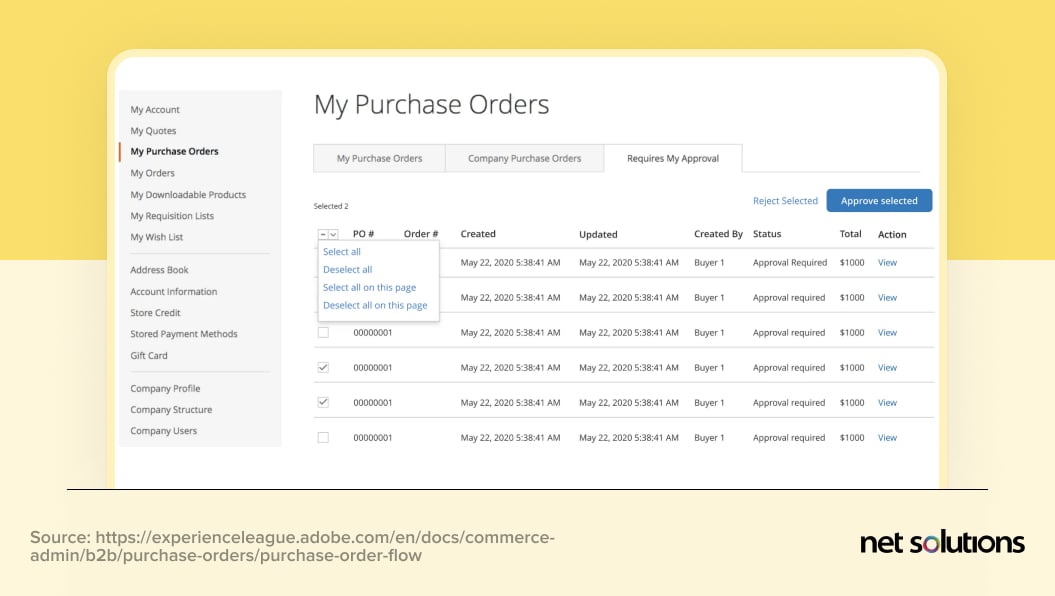
6. Flexible payment options for B2B
B2B buyers have different payment processes that can vary from buyer to buyer including: the ability to purchase on credit via a purchase order or via credit card, check , bank transfer, electronic fund transfers or virtual cards.
- Payment on account, supporting credit and purchase orders
- Cash on delivery, supporting deferred payment
- Built-in basic payment methods include check / money order, bank transfer
- Support for third-party payment gateways (e.g. TreviPay, PayPal, Moneris, Stripe)
Core Adobe Commerce features that support B2B
Since Adobe Commerce is a single system that lets you manage both B2B and B2C businesses, with B2B capabilities installed and enabled, many of the core features of the platform are still essential to B2B success. These include:
1. Inventory & fulfillment
Adobe Commerce supports both single source and multi-source inventory and fulfillment, with the option to integrate with more comprehensive inventory management software.
- Multi-source support: Inventory is managed from multiple vendors or locations, with customers only having access from assigned sources (set at the store level) or based upon an assigned priority.
- Set thresholds: Set notifications when stock is low, with options to support backorders, or set minimum or maximum quantity amounts
- Sales channels: Commerce provides B2B support to associate stock to specific sales channels
- Omnichannel: Offer seamless cross-channel commerce experiences and manage inventory across channels in real-time
- Flexible fulfillment: Picking, staging and order handoff capabilities, in-store inventory sync, global capabilities for appropriate shipping methods, shipment matching algorithms
2. Live Search powered by Adobe Sensei
Live Search is another no-cost additional hosted service that replaces standard search capabilities with AI-powered dynamic faceting and re-ranking of search results, based on shopper behaviors, to help buyers find what they are looking for in a shorter amount of time and includes additional features such as search as you type, synonym support, and supports merchandising rules to bury or boost products according to your needs.
3. Product Recommendations powered by Adobe Sensei
Adobe offers support for B2B workflows within its Product Recommendations hosted service, leveraging the Adobe Sensei AI to pair visitor data with catalog data to create recommendations based on popularity, trends, similarity, or recommendations specific to a shopper or item.
4. Enhanced security & performance
To support eCommerce security, Adobe offers critical protections in its platform-as-a-service (PaaS) offering as well as resources to help store owners manage security, all built on a high performance solution:
- Security resources: Support for MFA, 256-bit key encryption, Read-only production filesystem, single-tenant virtual machines, 99.9% SLA
- Compliance support: PCI-DSS certified as a Level 1 Solution Provider, HIPAA-ready, GDPR-ready, CCPA-ready
- Extra protections with Adobe Commerce Manage Services: Additional support to enhance security coverage, share best practices, assist with monitoring and patching
- Optimized performance: AWS-based environment with high-performance CDN and add-on SaaS accelerators.
5. Adobe Commerce Intelligence
Adobe Commerce Intelligence simplifies gathering and monitoring for business intelligence to track buyer patterns, enhance personalization, and inform business decisions including:
- Consolidate data sources to become a single source of truth
- Customizable dashboards to track KPIs including ROI, customer lifetime value, cohort analysis, merchandising analysis and more
- Automated report updates and export options
Mobile responsiveness
Adobe Commerce can be deployed in a traditional, hybrid or headless format, each optimized for mobile devices.
- Option to create a progressive web application (PWA) with PWA Studio
- Uses HTML5 technology and supports iPhone, Android, and mobile Opera browsers
- Headless commerce supports using Adobe storefronts (e.g. Adobe AEM), third-party storefronts, or a custom storefront to optimize storefronts for different channels and devices
Extensible with third-party applications
Adobe Commerce can be extended via a comprehensive marketplace of extensions or via API to integrate with your tech stack (e.g. CRM, ERP, inventory management). You can also extend via custom solutions supported by the Adobe Developer App Builder.
Adobe Commerce B2B Pricing
Adobe Commerce is available open-source and free as Magento Open Source or by license as Adobe Commerce Pro or Adobe Commerce Managed Services. The B2B extension is free to install and enable, but requires an Adobe Commerce license that starts at around $24,000 per year and can extend into the six figures.
Learn more in our in-depth Adobe Commerce Pricing Guide.
The Bottom Line
Adobe Commerce is a comprehensive eCommerce platform for your B2B business, but getting the backend infrastructure, integrations and optimizations right can require the help of an experienced partner. Net Solutions has been pleased to work with B2B clients around the world, including Euro Car Parts and Hancocks, to optimize their Magento 2 deployments.
Net Solutions offers comprehensive Magento development services to help deliver outstanding B2B business results. Reach out to see what we can do for your online store.
Frequently Asked Questions (FAQs)
Here are some commonly asked questions about Adobe Commerce and its B2B capabilities.
1. What is the difference between Adobe Commerce B2B and B2C?
Adobe Commerce is a single integrated platform for B2B and B2C commerce, but the B2B capabilities must be installed and enabled separately. The B2B extension supports the unique needs of B2B buyers including differentiated catalogs and pricing, corporate accounts, self-service capabilities, purchase orders, requisition lists for reordering, approval flows and more.
2. Is Adobe Commerce good for B2B?
Adobe Commerce is one of the most comprehensive and flexible B2B platforms, designed specifically for enterprise clients to deliver experiences at scale across brands, stores and locations. Adobe Commerce offers all the major capabilities a B2B business could need, but it is likely priced out of the range of smaller retailers. B2B organizations can also use Magento Open Source, but the deployment would require customization and a heavier use of individual extensions.


